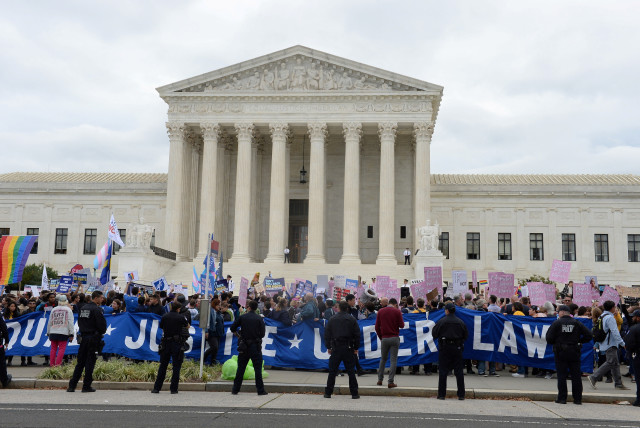Why an Orthodox group supports the Supreme Court ruling on not serving same-sex couples

The decision was not about discrimination or about religion and attempts to characterize it as such are disingenuous.
The Orthodox Jewish community boasts a wide array of creative services providers. And, in keeping with the Jewish religious tradition over millennia, those vendors cannot, in good conscience, buy into elements of “progressive” social developments. They do not accept, for instance, that it is proper to identify as a different sex from one’s biological one, or that a same-sex union is proper.
That is why my organization took a particular interest in 303 Creative LLC v. Elenis, in which the Supreme Court ruled in favor of Lorie Smith, a Christian web designer who refused to create wedding announcements for same-sex couples.
Ms. Smith feared that Colorado’s anti-discrimination law might compel her to create webpages celebrating same-sex unions, something that goes against her conscience.
The 303 Creative decision seems to be widely misunderstood and misrepresented.
The court decision is widely misunderstood and misrepresented
Not long after the Supreme Court handed down their decision, a small town hair salon owner said she would refuse service to clients who use pronouns different from their biological sex.
“If a human identifies as anything other than a man/woman, please seek services at a local pet groomer,” the hairdresser, Christine Geiger, posted on Facebook. “You are not welcome at this salon. Period.”
There ensued much “We told you so,” tying the hairdresser’s policy and comments to the 303 Creative decision.
The hairdresser may have been emboldened to offer her boorish words by the Supreme Court decision, but the plain meaning of the decision’s wording — as confirmed by scholars of the law — does not support her refusal of service.
Likewise, critics of the decision conjured a host of dire scenarios, like a devout Christian who believes that Jews killed Jesus refusing to sell wedding dresses to brides unless they accept Christianity, or a white supremacist baker who won’t sell his cakes and cookies to blacks or Asians.
None of these scenarios could conceivably emerge from the Supreme Court’s web designer decision, or be sustained if they did. The ruling does not sanction bigotry. It protects free speech.
We usually think of the First Amendment’s guarantee of a right of free expression in its simplest sense, that Americans are allowed to express their feelings as they wish without government interference.
But included in that Constitutional right is a protection against government coercion of a citizen to express a particular point of view.
That “compelled speech doctrine” dates back to a 1943 Supreme Court decision, West Virginia State Board of Education v. Barnette, where the Court ruled that a state cannot force children to stand, salute the flag and recite the Pledge of Allegiance if doing so violates their religious consciences.
Justice Robert H. Jackson famously asserted, “If there is any fixed star in our constitutional constellation, it is that no official, high or petty, can prescribe what shall be orthodox in politics, nationalism, religion, or other matters of opinion or force citizens to confess by word or act their faith therein.”
Lorie Smith is not a computer salesperson. Were she one, Colorado’s anti-discrimination law would legitimately require her to sell a computer to anyone, even someone whose lifestyle violates her sensibilities. Even as a web designer, she had and has no right, under her state’s law, to refuse service to a same-sex couple that wishes the site to promote their widget company.
In fact, a filing in the case stated clearly that she was “willing to work with all people regardless of classifications such as race, creed, sexual orientation, and gender.” And that she “will gladly create custom graphics and websites” for clients of any sexual orientation.
So what was Ms. Smith’s objection? Something simple: If faced with a request to create a website that expressed celebration of same-sex marriages, she feared being compelled by the state to employ her creativity in the service of something that violates her religious conscience.
The Supreme Court ruled in line with its predecessor Court’s 1943 interpretation of the First Amendment, that no American should have to fear being punished for her unwillingness to express something that violates her conscience.
So now, some truly plausible scenarios that could be born of the decision:
A web designer, in this case, someone deeply dedicated to LGBTQ causes, is asked to design a webpage for an anti-gay activist, graphically promoting the potential client’s point of view. Or a Jewish cake artist is asked by a neo-Nazi group to design a swastika-shaped cake with frosting in the likeness of Adolf Hitler.
Thanks to the 303 Creative decision’s affirmation of the compelled speech doctrine, the designer and baker will have the right to ask the client to go elsewhere to be serviced.
And, now, in a case where a client asks an observant Jew to enlist his or her talents in promoting what halacha (Jewish law) considers objectionable, he or she will be able to politely decline and suggest an alternative service. The “politely” is vital. Deeply held beliefs might be hurtful to others, but living one’s values sometimes means making decisions that inadvertently cause pain. Rudeness, though, is never in order.
The High Court decision was not about discrimination or about religion, though. And attempts to characterize it as such, or as license to show bias against people because of their race, religion or sexual orientation are disingenuous.
In the words of the majority opinion: “The First Amendment envisions the United States as a rich and complex place where all persons are free to think and speak as they wish, not as the government demands.”
The decision, in other words, was about the Constitution’s protection of citizens’ rights.
About freedom.
Jerusalem Post Store
`; document.getElementById("linkPremium").innerHTML = cont; var divWithLink = document.getElementById("premium-link"); if (divWithLink !== null && divWithLink !== 'undefined') { divWithLink.style.border = "solid 1px #cb0f3e"; divWithLink.style.textAlign = "center"; divWithLink.style.marginBottom = "15px"; divWithLink.style.marginTop = "15px"; divWithLink.style.width = "100%"; divWithLink.style.backgroundColor = "#122952"; divWithLink.style.color = "#ffffff"; divWithLink.style.lineHeight = "1.5"; } } (function (v, i) { });

